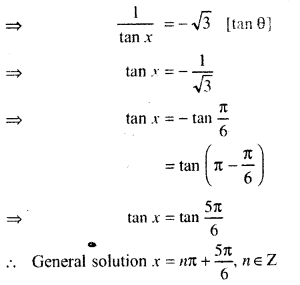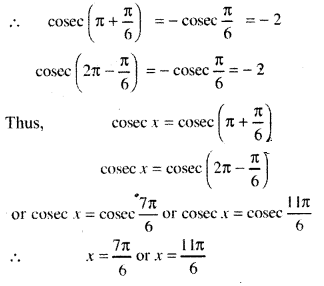RBSE Solutions for Class 11 Maths Chapter 3 Trigonometric Functions Ex 3.4
Rajasthan Board RBSE Solutions for Class 11 Maths Chapter 3 Trigonometric Functions Ex 3.4 Textbook Exercise Questions and Answers.
Rajasthan Board RBSE Solutions for Class 11 Maths in Hindi Medium & English Medium are part of RBSE Solutions for Class 11. Students can also read RBSE Class 11 Maths Important Questions for exam preparation. Students can also go through RBSE Class 11 Maths Notes to understand and remember the concepts easily.
RBSE Class 11 Maths Solutions Chapter 3 Trigonometric Functions Ex 3.4
Find the principal and general solutions of the following equations :
Question 1.
tan x = √3
Answer:
Since, tan \(\frac{\pi}{3}\) = √3
tan x = √3 = tan 60° = tan \(\frac{\pi}{3}\)
x = \(\frac{\pi}{3}\)
Again, tan x = √3 = tan(π + \(\frac{\pi}{3}\)) = tan\(\frac{4 \pi}{3}\)
∴ x = \(\frac{4 \pi}{3}\)
Since, value ofx less between 0 and 2π so principal solution or given equation is x = \(\frac{\pi}{3}\) or \(\frac{4 \pi}{3}\)
For general solution,
tan x = √3 = tan \(\frac{\pi}{3}\)
So, x = \(\frac{\pi}{3}\)
then general solution of x = nπ + \(\frac{\pi}{3}\), n ∈ Z
Question 2.
sec x = 2
Answer:
We know that sec \(\frac{\pi}{3}\) = 2
Thus, sec x = 2 = sec \(\frac{\pi}{3}\) = sec(2π - \(\frac{\pi}{3}\))
Thus, x = \(\frac{\pi}{3}\) or x = (2π - \(\frac{\pi}{3}\))
x = \(\frac{\pi}{3}\) or x = \(\frac{5 \pi}{3}\)
Thus, principal solution of given equation x = \(\frac{\pi}{3}\) or \(\frac{5 \pi}{3}\) since principal solution of trigonometric equation lies between 0 and 2π and for general value,
∵ sec x = 2
⇒ \(\frac{1}{cos x}\) = 2
⇒ cos x = \(\frac{1}{2}\)
⇒ cos x = cos \(\frac{\pi}{3}\)
General value x = 2nπ ± \(\frac{\pi}{3}\)
Thus, general solution x = 2nπ ± \(\frac{\pi}{3}\), n ∈ Z
Question 3.
cot x = -√3
Answer:
Since cot\(\frac{\pi}{6}\) = √3
So, cot(π - \(\frac{\pi}{6}\)) = -√3
or cot(2π - \(\frac{\pi}{6}\)) = -√3
or cot x = cot(π - \(\frac{\pi}{6}\)) or = cot (2π - \(\frac{\pi}{6}\))
x = \(\frac{5 \pi}{6}\) or \(\frac{11 \pi}{6}\)
Thus principal solution of given equatitn x = \(\frac{5 \pi}{6}\) or \(\frac{11 \pi}{6}\)
For general value cot x = -√3


Question 4.
cosec x = -2
Answer:
cosec x = -2
Since, cosec \(\frac{\pi}{6}\) = 2

Thus, principal solution of given equation x = \(\frac{7 \pi}{3}\) or \(\frac{11 \pi}{3}\) and general equation x = nπ + (-1)n\(\frac{7 \pi}{6}\), n ∈ Z
Find the general equation for each of the following equations
Question 5.
cos 4x = cos 2x
Answer:
From given equation
cos 4x = cos 2x
cos (2nπ ± 2x) = cos 2x [∵ cos(2nπ + x) = cosx]
Thus, taking general value form equation
cos 4x = cos(2nπ ± 2x)
4x = 2nπ ± 2x
Taking '+' sign
⇒ 4x = 2nπ + 2x.
⇒ 4x - 2x = 2nπ
⇒ 2x = 2nπ,
⇒ x = nπ, n ↔ Z.
Taking '-' sign
⇒ 4x =2nπ - 2x
⇒ 4x + 2x = 2nπ
⇒ 6x = 2nπ
⇒ x = \(\frac{n \pi}{3}\), n ∈ Z
Thus, general solution of given equation
x = nπ or \(\frac{n \pi}{3}\). n ∈ Z
Question 6.
cos 3x + cos x - cos 2x = 0
Answer:
From given equation
cos 3x + cos x - cos 2x = 0
2 cos\(\frac{3 x+x}{2}\) cos\(\frac{3 x-x}{2}\) cos 2x = 0
[By formula cos x + cos y = 2 cos \(\frac{(x+y)}{2}\), cos \(\frac{(x-y)}{2}\)]
⇒ 2cos2x cosx - cos2x = 0
⇒ cos 2x(2cos x - 1) = 0
or then cos 2x = 0 or 2cos x - 1 = 0
It cos 2x = 0 = cos \(\frac{\pi}{2}\) or cos x = \(\frac{1}{2}\) = cos \(\frac{\pi}{3}\)
2x = (2n + 1)\(\frac{\pi}{2}\)
⇒ x = (2n + 1)\(\frac{\pi}{4}\), n ∈ Z
or cos x = cos\(\frac{\pi}{3}\)
x = 2mπ ± \(\frac{\pi}{3}\)
Thus general solution of given equation
x = (2n + 1)\(\frac{\pi}{4}\) or 2mπ ± \(\frac{\pi}{3}\), n. m ∈ Z
Question 7.
sin 2x + cos x = 0
Answer:
Given equation, sin 2x + cos x = 0
2 sin x cos x+cos x = 0 (∵ sin 2x = 2sin x cosx)
cos x(2sin x + 1) = 0
then cos x = 0, or 2 sin x + 1 = 0
cos x = 0, or 2 sin x = - 1
x = (2n + 1)\(\frac{\pi}{2}\) where n ∈ Z,
or sin x = -\(\frac{1}{2}\) = sin(π + \(\frac{\pi}{6}\))
∴ sin x = sin(π + \(\frac{\pi}{6}\)) ⇒ sin x = sin \(\frac{7 \pi}{6}\)
Taking general value x = \(\frac{7 \pi}{6}\), m ∈ Z
x = mπ + (-1)m \(\frac{7 \pi}{6}\), m ∈ Z
Thus, General solution of given equation
x = mπ + (-1)m \(\frac{7 \pi}{6}\)
(2n + 1)\(\frac{7 \pi}{2}\), n ∈ Z, m ∈ z
Question 8.
sec22x = 1 - tan 2x
Answer:
From the equation sec22x = 1 - tan 2x
1 + tan2x = 1 - tan 2x
tan22x + tan 2x = 0
tan 2x(tan 2x + 1) = 0
tan 2x = 0 or tan 2x + 1 = 0
Taking general value
2x = nπ + 0 or tan2x = -1 = -tan\(\frac{\pi}{4}\)
x = \(\frac{n \pi}{2}\), n ∈ Z or tan 2x = tan(π - \(\frac{\pi}{4}\))
tan 2x = tan\( \frac{3 \pi}{4}\),
Taking general value
2x = mπ + \(\frac{3 \pi}{4}\)
x = \(\frac{m \pi}{2}+\frac{3 \pi}{8}\), m ∈ Z
Thus, general solution of given equation
x = \(\frac{n \pi}{2}\) or \(\frac{m \pi}{2}+\frac{3 \pi}{8}\), m ∈ Z

Question 9.
sin x + sin 3x + sin 5x = 0
Answer:
sin x + sin 3x + sin 5x = 0
sin 3x + 2sin\(\frac{5 x+x}{2}\) cos\(\frac{5 x-x}{2}\) = 0
{∵ sin x + sin y = 2 sin\(\frac{x+y}{2}\)cos\(\frac{x-y}{2}\)}
sin3x + 2sin3xcos2x = 0
sin3x(1 + 2cos2x) = 0
If sin 3x = 0
3x = nπ
x = \(\frac{n \pi}{2}\), n ∈ Z
If 1 + 2cos2x = 0
2 cos 2x = -1
cos 2x = -\(\frac{1}{2}\)
cos 2x = cos(π - \(\frac{\pi}{3}\)) = cos\(\frac{2 \pi}{4}\)
cos 2x = cos\(\frac{2 \pi}{4}\) (Taking general value)
2x = 2mπ ± \(\frac{2 \pi}{3}\)
x = mπ ± \(\frac{2 \pi}{3}\), m ∈ Z
Thus general solution of given equation
x = \(\frac{n \pi}{3}\), or mπ = ±\(\frac{\pi}{3}\), n, m ∈ Z

- RBSE Solutions for Class 11 Maths Chapter 3 त्रिकोणमितीय फलन Ex 3.1
- RBSE Solutions for Class 11 Maths Chapter 2 संबंध एवं फलन विविध प्रश्नावली
- RBSE Solutions for Class 11 Maths Chapter 2 संबंध एवं फलन Ex 2.3
- RBSE Solutions for Class 11 Maths Chapter 2 संबंध एवं फलन Ex 2.2
- RBSE Solutions for Class 11 Maths Chapter 2 संबंध एवं फलन Ex 2.1
- RBSE Solutions for Class 11 Maths Chapter 1 समुच्चय विविध प्रश्नावली
- RBSE Solutions for Class 11 Maths Chapter 1 समुच्चय Ex 1.6
- RBSE Solutions for Class 11 Maths Chapter 1 समुच्चय Ex 1.5
- RBSE Solutions for Class 11 Maths Chapter 1 समुच्चय Ex 1.4
- RBSE Solutions for Class 11 Maths Chapter 1 समुच्चय Ex 1.3
- RBSE Solutions for Class 11 Maths Chapter 1 समुच्चय Ex 1.2